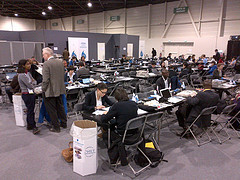Agence France Presse (AFP) reports that, “A five-page (Ministerial Declaration), endorsed by 130 national representatives including 84 ministers, was issued (today) at the World Water Forum…. A Canadian NGO, the Council of Canadians, described the Water Forum, held every three years, as ‘the Davos of Water, a non-democratic forum run by multinational water corporations’.”
The ministerial statement
The declaration states, “Reiterating our commitment to fully achieve the Millennium Development Goals, and following the adoption of United Nations resolutions related to the recognition of the human right to safe and clean drinking water and sanitation, we commit to accelerate the full implementation of the human rights obligations relating to access to safe and clean drinking water and sanitation by all appropriate means as a part of our efforts to overcome the water crisis at all levels.”
What’s wrong with that?
Blue Planet Project organizers Mary Galvin and Claudia Campero Arena were present for the media conference when the ministerial declaration was released.
Campero Arena notes, “I asked, ‘Why did Canada water down the language in the declaration regarding the human right to water and sanitation?’ I mentioned the press release by Amnesty International and said that they had explained the differences from the original text. He was clearly angry at me! He just said they wanted to move further and that the issues around the declaration was because the forum wanted to be very ambitious. Anyway, the highlight, I think is that this press conference was a purposeful detour from what was really going on.”
“Anyway, the highlight, I think is that this press conference was a purposeful detour from what was really going on. They were trying to take the press elsewhere while the Bolivian minister said they didn’t endorse!”
Galvin adds, “In response to questions at the media conference about weakening the language on the human right to water, they said they could have copied the United Nations text but argued that it is important for all countries to ‘implement’ the right not just recognize it because that is already required under the UN resolution. They noted too that the declaration emphasizes ‘accelerating implementation’.”
WASH-United and Amnesty International have previously countered the assertions made at today’s media conference by noting, “This language leaves open the issue of whether access to safe drinking water and sanitation is a human right. The language thereby leaves room for States to individually determine whether their human rights obligations require them to realize the right to safe drinking water and sanitation for all.”
Opposition to the statement
AFP highlights, “The communique was contested by Bolivian Environment and Water Minister Felipe Quispe Quenta. According to journalists who attended the ministerial plenary, his microphone was cut off, purportedly for time reasons, after he said the text did not include clear references to social justice and the right to water. ‘We expressed our disagreement when the statement was being drafted and we were not heard. Bolivia does not go along with this ministerial declaration,’ the minister said to reporters after the session.”
“Wenonah Hauter, executive director of a small US NGO, Food and Water Watch, said the Forum was viewed with suspicion by many grass-roots organisations on water, sustainable development and the environment. ‘I think there is no interest (here) in having a debate or dialogue,’ she told AFP. ‘We have a trade fair that is being promoted as a ministerial, but what we really need is the UN to take hold of the process. We cannot have the water industry dictate the issues.’”
More coverage
AFP reports (en français), “Members of an American NGO, Food and Water Watch, have managed to enter the ministerial session on Tuesday afternoon and found that they had deliberately reduced the time allowed the Bolivian Minister in his speech. Similarly the NGO Council of Canadians said the Canadian ministerial delegation had obtained to change the wording on the right to access to drinking water, while the indigenous people of this great industrial country live in conditions worse than those of the poorest.”
An Ingeniería Sin Fronteras y Ecologistas en Acción de España (Engineers Without Borders and Ecologists In Action in Spain) blog highlights (en español), “The Council of Canadians has been told that Canada has been the main promoter of change in the final Ministerial Declaration, which has proven elusive in the language and objectives inconclusive. This statement is far from what was approved by the UN in 2010, when it was recognized that water and sanitation as basic human rights. It may be recalled that in recent months, Canada has excelled in the world arena for radical change in its environmental approach, without going any further, abandoning the Kyoto Protocol after the last climate conference in Durban.”
More to come
Council of Canadians water campaigner Meera Karunananthan was also interviewed by the Guardian UK and CBC Radio-Canada this evening about the declaration. We’ll add that article to this blog as soon as it is posted.
Brent Patterson, Political Director, The Council of Canadians
www.canadians.org/wwf



